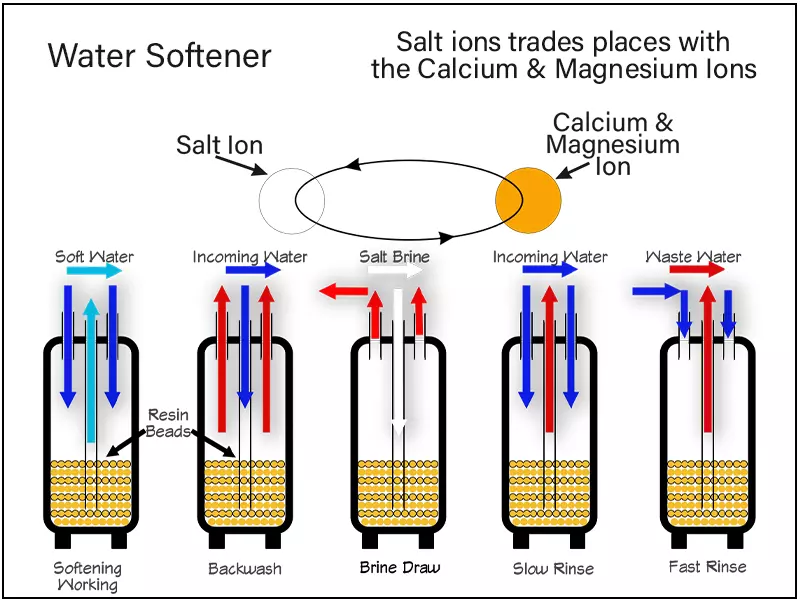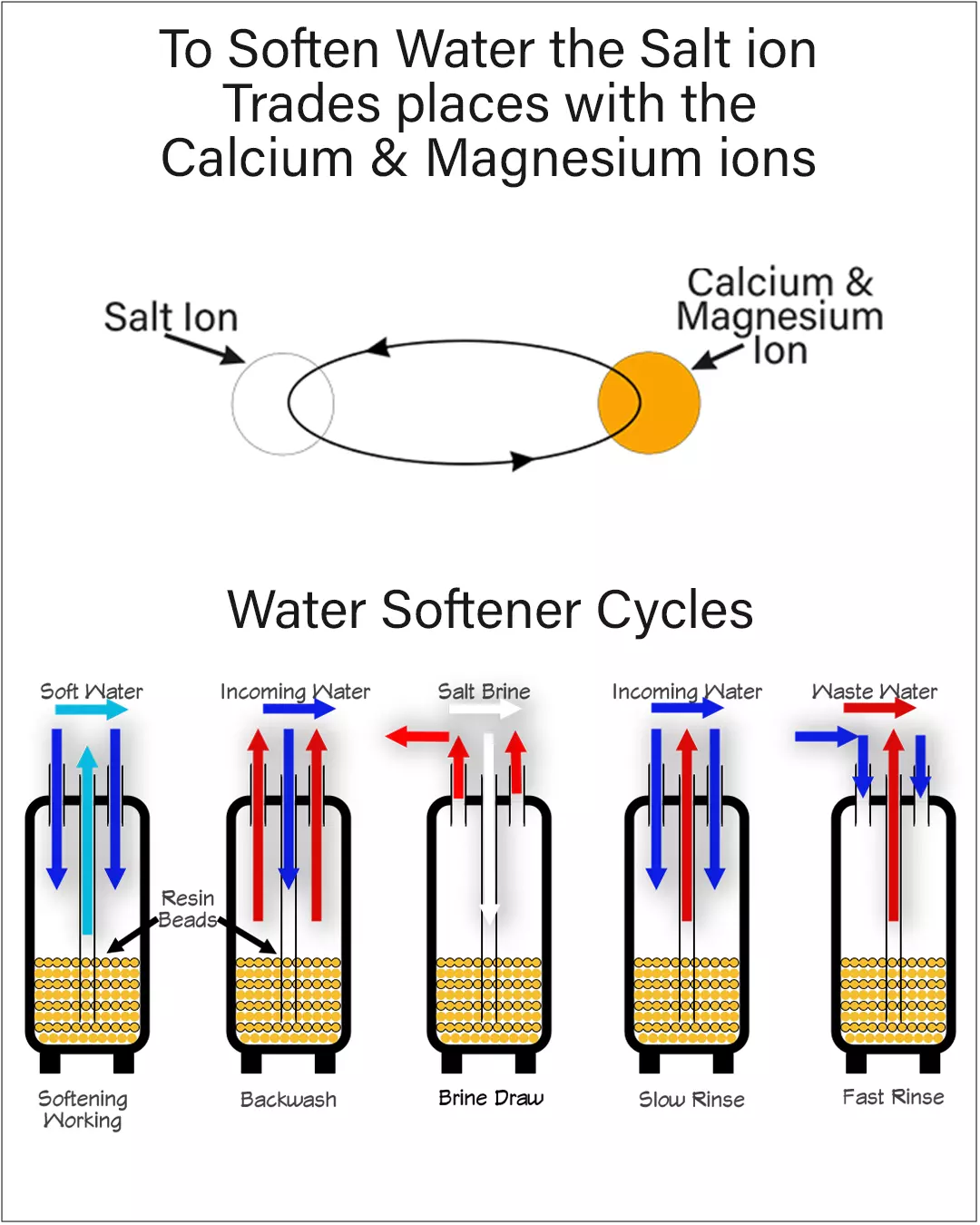

The Appliance
What is that Strange Contraption in the Garage that we Pour all that Salt into? What is it Doing with all the Salt and Is it Bad or Good, are we Wasting Water?
Water Softeners, like some Appliances in our Home are Considered Necessary. In some Parts of the US and around the World The Calcium & Magnesium in the Water will cause Problems, easily Remedied with a Water Softener.
Hard Water
Hard Water, as it is Called, does contain Large Amounts of Calcium & Magnesium ions. These ions Interfere with the Action of Soaps and Detergents. Shower Glass and Fixtures can be Permanently Damaged from these Minerals and Soap Residue as the Moisture Evaporates leaving an Undesirable Deposit.
The Chart below Classifies Water Hardness based on Grains per Gallon and Parts Per Million, your Water Provider may Report Their Hardness level either way.
Softened Water should be Separate from Water going to the Outside Hose Bibs and Irrigation Water. Some Medical and Other Professionals Suggest that we only Soften the Hot Water.
Most if not all Newer Homes are Pre-Plumbed to accommodate a Water Softener. In Older Homes some Re-Plumbing will be Needed.
Hardness Classes
Soft Water
- Less than 1.0 Grains per Gallon
- or Less than 17 PPM, Parts per Million
Low Hardness
- 1.0 - 3.5 Grains per Gallon
- or 17 PPM - 60 Parts per Million
Moderate Hardness
- 3.5 - 7.0 Grains per Gallon
- or 60 - 120 Parts per Million
Hard
- 7.0 - 10.5 Grains per Gallon
- 120 - 180 Parts per Million
Very Hard
- Higher than 10.5 Grains per Gallon
- More than 180 Parts per Million
The Exchange
The Process of removing the Calcium and Magnesium from Water is called 'ion Exchange". This is a Physical and Chemical Process where Water is passed through a Tank of Resin Beads that are Positively Charged with Sodium ions.
As the Calcium and Magnesium ions come in contact with the Sodium ions on the Beads, the ions Trade Places, the Calcium ions stay on the Beads and the Water leavening is now charged with Sodium ions and is considered Soft.
The Bead Chamber will only Absorb a Certain Amount of Calcium and Magnesium ions. The Calcium & Magnesium ions now on the Resin Beads should be Washed off and Down the Drain so more Incoming Water can be Softened. The Process of Washing the Beads is Called Regeneration. There are 4 Stages in the Regeneration Cycle.
Regeneration
Stage 1 - Is like Backwashing your Swimming Pool Filter. The Water Flow is Reversed, incoming Water is Channeled into the Bottom of the Bead Chamber. The Water Flows through the Bead Chamber to the Drain. The Process Loosens Compacted Beads and Washes away any unwanted Suspended Solids.
Stage 2 - The Chamber is then Flooded from the Top with Brine Water from the Brine Tank. While the Sodium ions flow over the Beads they Displace the Calcium and Magnesium ions pushing them to the Drain.
Stage 3 - Un-Treated Supply Water enters the Chamber from the Top slowly Washing The Beads and Forcing The Brine Water to the Drain.
Stage 4 - The Final Rinse is a Faster Flow of Un-Treated Water to completely clean any remaining Calcium, Magnesium and Brine Water to the Drain.
The System is now Ready to Exchange Calcium & Magnesium ions for Sodium ions. It is Recommended Not to use Water During the Regeneration Process, If you did you could fill the Hot Water Tank with Un-Treated Water that could cause a Calcium Build Up in the Tank.
A Regeneration cycle could happen 1 to 3 Times per week depending on Your Water Usage, each Regeneration will use between 20 to 65 Gallons of Water.
Newer Efficient Water Softeners will use less water and Salt. Regeneration Frequencies and Duration is determined by the Water Usage and Bead Chamber Size.
Size of Resin Bed
A cubic foot of Resin Beads can effectively Treat or Remove Calcium and Magnesium ions from +/- 3,200 Gallons of Water Hard Water (@ 10 grains hardness). The Process will add approximately 750 milligrams of Sodium to each Gallon of Water. see FDA Sodium Intake link below.
Alternatives
There are no other Methods to Effectively Remove the Calcium and Magnesium from your Water. You can however Control the Calcium without Salt, See link below, our Article "No Salt Water Treatment" by using Electromagnetic Field (EMF) or Template Assisted Crystallization (TAC).
Comment Below
Internal Links
External Link
Food & Drug Administration (FDA) Article Subject: Sodium and Blood Pressure
Like this Article, you can give us a Thumbs just click on the Icon. It's anonymous and we will Thank You.

“Of all things, I liked books best”
Nicola Tesla
© Copyright 2023 YPRemodel.com. All rights Reserved. This material may not be Published, Broadcast, Rewritten or Redistributed without written Permission.
